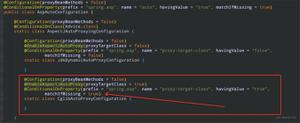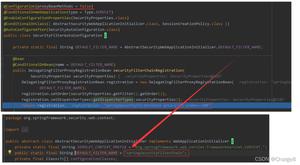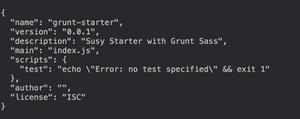Spring AOP中pointcut expression表达式解析 及匹配多个条件
本文内容纲要:Spring AOP中pointcut expression表达式解析 及匹配多个条件
Pointcut 是指那些方法需要被执行"AOP",是由"Pointcut Expression"来描述的.
Pointcut可以有下列方式来定义或者通过&& || 和!的方式进行组合.
args()
@args()
execution()
this()
target()
@target()
within()
@within()
@annotation
其中 execution 是用的最多的,其格式为:
execution(modifiers-pattern? ret-type-pattern declaring-type-pattern? name-pattern(param-pattern)throws-pattern?)
returning type pattern,name pattern, and parameters pattern是必须的.
ret-type-pattern:可以为*表示任何返回值,全路径的类名等.
name-pattern:指定方法名,*代表所以,set*,代表以set开头的所有方法.
parameters pattern:指定方法参数(声明的类型),(..)代表所有参数,(*)代表一个参数,(*,String)代表第一个参数为任何值,第二个为String类型.
举例说明:
任意公共方法的执行:
execution(public * *(..))
任何一个以“set”开始的方法的执行:
execution(* set*(..))
AccountService 接口的任意方法的执行:
execution(* com.xyz.service.AccountService.*(..))
定义在service包里的任意方法的执行:
execution(* com.xyz.service.*.*(..))
定义在service包和所有子包里的任意类的任意方法的执行:
execution(* com.xyz.service..*.*(..))
定义在pointcutexp包和所有子包里的JoinPointObjP2类的任意方法的执行:
execution(* com.test.spring.aop.pointcutexp..JoinPointObjP2.*(..))")
***> 最靠近(..)的为方法名,靠近.*(..))的为类名或者接口名,如上例的JoinPointObjP2.*(..))
aop:config
<aop:pointcut expression="execution(* com.travelsky.ccboy.dao..*.find*(..)) ||
execution(* com.travelsky.ccboy.dao..*.query*(..))"
id="findCachePointcut" />
<aop:advisor advice-ref="jdbcInterceptor" pointcut-ref="findCachePointcut" />
</aop:config>
在多个表达式之间使用 || , or 表示 或 ,使用 && , and 表示 与 , ! 表示
非
.
上面的代码也可以改写成
aop:config
<aop:pointcut expression=" ( execution(* com.travelsky.ccboy.dao..*.find*(..))) or(execution(* com.travelsky.ccboy.dao..*.query*(..))
)
"
id="findCachePointcut" />
<aop:advisor advice-ref="jdbcInterceptor" pointcut-ref="findCachePointcut" />
</aop:config>
注意上面两中方法的不同点出了 将 || 改成了 or ,还有就是 每个execution都被 ()包含起来,建议为了区分不同的表达式 最好都是用()包装。
pointcutexp包里的任意类.
within(com.test.spring.aop.pointcutexp.*)
pointcutexp包和所有子包里的任意类.
within(com.test.spring.aop.pointcutexp..*)
实现了Intf接口的所有类,如果Intf不是接口,限定Intf单个类.
this(com.test.spring.aop.pointcutexp.Intf)
***> 当一个实现了接口的类被AOP的时候,用getBean方法必须cast为接口类型,不能为该类的类型.
带有@Transactional标注的所有类的任意方法.
@within(org.springframework.transaction.annotation.Transactional)
@target(org.springframework.transaction.annotation.Transactional)
带有@Transactional标注的任意方法.
@annotation(org.springframework.transaction.annotation.Transactional)
***> @within和@target针对类的注解,@annotation是针对方法的注解
参数带有@Transactional标注的方法.
@args(org.springframework.transaction.annotation.Transactional)
参数为String类型(运行是决定)的方法.
args(String)
Pointcut 可以通过Java注解和XML两种方式配置,如下所示:
<bean id="bravemandao" class="com.test.dao.BraveManDao"> <property name="barveman" ref="braveman"></property> </bean> <bean id="braveman" class="com.test.bean.BraveMan"> </bean> <bean id="minstrel" class="com.test.bean.Minstrel"></bean> <aop:config> <aop:aspect ref="minstrel"> <aop:pointcut expression="execution(* *.test(..))" id="say"/> <aop:before pointcut-ref="say" method="singBeforeSay"/> <aop:after pointcut-ref="say" method="singAfterSay"/> </aop:aspect> </aop:config>package com.test.bean;
public class Minstrel {
public void singBeforeSay(){ System.out.println("before say!!!"); } public void singAfterSay(){ System.out.println("after say!!!"); } }
public class BraveManDao {
BraveMan braveman;
public BraveMan getBarveman() { return braveman; } public void setBarveman(BraveMan braveman) { this.braveman = braveman; } public void test(){ braveman.say(); } }
本文内容总结:Spring AOP中pointcut expression表达式解析 及匹配多个条件
原文链接:https://www.cnblogs.com/1020182600HENG/p/6863845.html
以上是 Spring AOP中pointcut expression表达式解析 及匹配多个条件 的全部内容, 来源链接: utcz.com/z/362871.html







